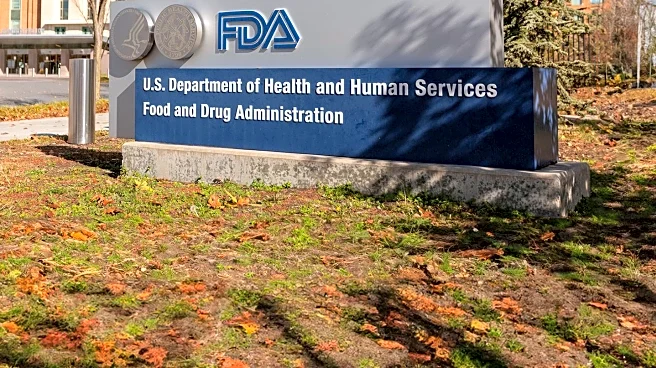What's Happening?
Belgian biopharmaceutical company UCB has received approval from the U.S. Food and Drug Administration (FDA) for Kygevvi, the first drug designed to treat thymidine kinase 2 deficiency (TK2d). TK2d is a rare and often fatal genetic disorder that affects
mitochondrial DNA production and repair, leading to severe muscle weakness and respiratory failure. The approval marks the U.S. as the first country to authorize this treatment, which is available as an oral solution for both pediatric and adult patients who experienced symptom onset at age 12 or younger. Clinical trials have shown that Kygevvi significantly reduces the risk of death and helps patients regain lost motor skills, with the most common side effect being diarrhea.
Why It's Important?
The approval of Kygevvi is a significant milestone in the treatment of rare genetic disorders, providing a new therapeutic option for patients with TK2d, a condition with limited treatment options and a high mortality rate. This development is particularly important for families affected by TK2d, as it offers a chance to improve quality of life and extend survival. The drug's approval also highlights the potential of targeted genetic therapies to address rare diseases, which could encourage further research and development in this field. UCB's success may inspire other pharmaceutical companies to invest in treatments for rare conditions, potentially leading to breakthroughs for other underserved patient populations.
What's Next?
UCB plans to launch Kygevvi in the U.S. market in the first quarter of 2026. The company has also filed for approval in the European Union and has received various designations that could expedite the drug's availability in other regions. As the drug becomes available, healthcare providers and patients will likely monitor its real-world effectiveness and safety. The approval may also prompt further research into TK2d and similar genetic disorders, potentially leading to new insights and treatments. Stakeholders, including patient advocacy groups and healthcare professionals, will be closely watching the rollout and impact of Kygevvi.
Beyond the Headlines
The development and approval of Kygevvi underscore the importance of collaborative research and the role of compassionate use in advancing medical treatments. The journey from early research to FDA approval involved significant contributions from academic researchers, industry partners, and patient advocates. This case highlights the potential for innovative therapies to emerge from such collaborations, offering hope to patients with rare and challenging conditions. The success of Kygevvi may also influence regulatory approaches to rare disease treatments, potentially leading to more streamlined approval processes for similar therapies in the future.














